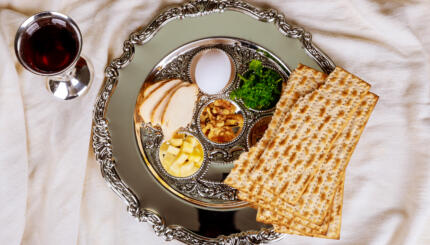As Passover draws to a close this weekend, I’m thinking about two things: a pizza binge on Friday night and the theme of questions. (In the Reform movement, Passover and other festivals end one day earlier than they do among other Jews in the Diaspora.) A central part of Passover observance (particularly at the seder meal) is retelling a story, and that storytelling kicks off with the four questions.
In effect, those questions raise the issue: why are we acting so differently tonight? And the answer is that we are celebrating a story that compels us to think differently about ourselves, our place in the world, and how we treat others.
While the Passover Haggadah (the book containing the story) presents a traditional set of four questions, we should not view it as a fixed text. The ancient rabbis who wrote the initial Passover questions intended them to be samples of the types of questions to be asked, but somewhere along the way they were frozen and became The Four. At my Passover table, I usually ask people what other questions are on their minds and encourage spontaneous questions as much as traditional ones.
And it’s not just questions that matter, but how we answer them. The ancient rabbis interpreted the fact that the Torah says in four different places that a father should tell his son the story of Passover to mean that the Torah speaks of four kinds of children: a wise child, a rebellious child, a simple child, and one who does not know how to ask. Each deserves a different kind of answer to his/her individual question.
The truth is we learn from everyone. Maimonides, a 12th-century philosopher wrote that “even as a small piece of wood kindles a large log, so a pupil of small attainment sharpens the mind of a teacher, so that by his questions, he elicits glorious wisdom.” You never know from whom you are going to learn something profound.
As a community we need to think, not only on Passover but year-round, about including all types of learners. Note that even the rebellious child is at the seder. Even the child who does not know how to ask is included. We do not exclude or reject. We celebrate a Judaism that celebrates the inclusion of all, and we learn from other another.
seder
Pronounced: SAY-der, Origin: Hebrew, literally "order"; usually used to describe the ceremonial meal and telling of the Passover story on the first two nights of Passover. (In Israel, Jews have a seder only on the first night of Passover.)
Torah
Pronunced: TORE-uh, Origin: Hebrew, the Five Books of Moses.



